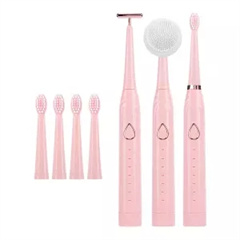Oral care for seniors is important to maintain good oral health and overall well-being. As people age, there are certain considerations to keep in mind when it comes to toothbrushes and oral hygiene. Here are some special considerations and tips:
1. Toothbrush Selection:
- Soft Bristles: Seniors often have more sensitive gums, so using a toothbrush with soft bristles is recommended to prevent gum irritation.
- Large Handle: Look for toothbrushes with larger handles that are easy to grip, especially for seniors with arthritis or limited dexterity.
- Electric Toothbrush: An electric toothbrush can be beneficial for seniors as it requires less physical effort and can provide a more thorough cleaning. Some models have features like timers and pressure sensors.
- Specialty Toothbrushes: There are toothbrushes designed for specific needs, such as those with angled bristles for hard-to-reach areas or toothbrushes with rubber tips for massaging gums.
2. Brushing Technique:
- Gentle Brushing: Encourage seniors to brush gently to avoid damaging delicate gum tissue. Use a soft, circular motion and take extra care around the gumline.
- Two-Minute Rule: Remind them to brush for at least two minutes to ensure thorough cleaning.
3. Oral Health Challenges:
- Dry Mouth: Many seniors experience dry mouth, which can lead to increased risk of cavities and gum problems. Consider using a toothpaste or mouthwash specifically formulated for dry mouth.
- Dentures: If the senior wears dentures, these should be cleaned daily as well. Denture brushes and specific cleaners are available for this purpose.
- Sensitive Teeth: Seniors may be more prone to tooth sensitivity. Using a toothpaste designed for sensitive teeth can help alleviate discomfort.
4. Dental Visits:
- Regular Check-ups: Encourage seniors to visit the dentist regularly for check-ups and cleanings. These visits can help identify and address any oral health issues promptly.
5. Mobility and Assistance:
- Assistance: If a senior has limited mobility or health issues, they may need assistance with their oral care routine. Family members, caregivers, or dental professionals can provide guidance and support.
6. Nutrition:
- Balanced Diet: A healthy diet rich in fruits, vegetables, whole grains, lean proteins, and dairy products supports oral health. Adequate nutrients are important for maintaining strong teeth and gums.
7. Medications:
- Side Effects: Some medications can affect oral health. Seniors should inform their dentist about all the medications they are taking to address any potential issues.
8. Dental Implants:**
- Implant Care: If the senior has dental implants, special care may be required to keep them clean and free from plaque buildup.
9. Hydration:
- Stay Hydrated: Encourage seniors to stay hydrated by drinking water throughout the day. Hydration helps maintain saliva flow, which is essential for oral health.
It’s important to customize oral care routines to each individual’s needs and limitations. If you’re a caregiver, working with dental professionals can help create a plan that ensures seniors receive the best oral care possible.








